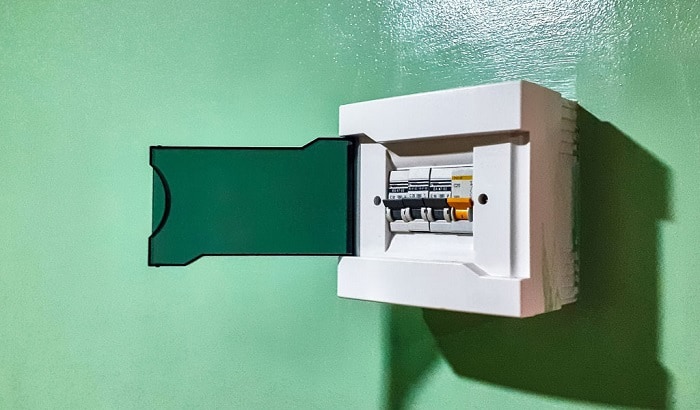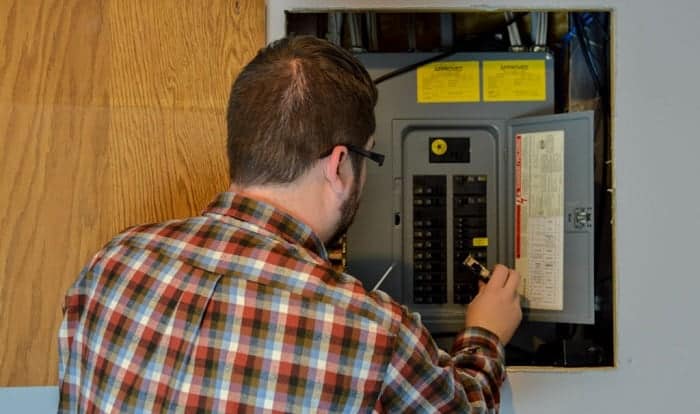Do you often notice that your circuit breaker heats up? Do you want to know how hot is too hot for a circuit breaker? Do you want to know how to measure the heat of a circuit breaker easily?
If these are all your problems, I will answer your concerns in this article. Circuit breakers are expected to have warm temperatures due to the current passing through them. However, if they get too hot, they will trip.
Table of Contents
How Can You Tell that the Temperature of a Circuit Breaker is Too Hot
Usually, the maximum operating temperature of a circuit breaker is 140 degrees Fahrenheit. When it reaches this limit and doesn’t trip, you may have a faulty circuit breaker.
First, to avoid unnecessary heating, check the screw terminals holding the wire – if they are loose, it may cause a temperature increase. However, if the terminals are secure and are still heating up, the best solution is to replace them. But before that, you must consider measuring the temperature of your circuit breaker. Here’s a guide that will help you estimate the heat of your circuit breaker.
How to Measure the Temperature of a Circuit Breaker
You can easily use a thermometer or a thermal scanner camera to identify your circuit breaker’s temperature. But if you don’t have those tools, you can also use the back of your finger to determine if the circuit breaker is too hot.
To measure the heat of your circuit breakers, scan them one by one using your thermometer. You can also check your entire circuit breaker panel using your thermal scanner. You can watch this video by Keysight General Purpose Instruments to learn how to use your thermal scanner camera.
As for using the back of your finger, here’s how you do it. Gently touch the rear of your index finger to each circuit breaker to identify if any is warmer than usual. You will know if a breaker is too hot if you feel your finger get a bit scorched. Here’s the video by MBJ DIY to explain more about this technique.
Why Does a Circuit Breaker Heat Up and Trip
If you wonder why your circuit breaker is frequently tripping, here are some causes.
- The most common reason for tripping circuit breakers is overloading. That means you’re drawing too many amps on your circuit, or you are plugging too many devices into it. This can happen when you’re using up more than 80 percent of its rated capacity. So, if you are using a 20 amp circuit breaker, it is recommended to use up to 16 amps only. You may maximize its 20 amp capacity, but for a short and limited time only. The breaker will trip when it hits its maximum temperature capacity.
- The second common reason is short circuits and damaged & loose wiring. Wiring can be damaged if you accidentally drill through a wire conduit or if you have pests chewing through your wiring. It can also happen if you have an old home and your wiring insulation isn’t as good as it used to be.
- The third common reason is a weak circuit breaker. Your circuit breaker may weaken over the time you use it, especially if this breaker is over ten years old. For example, if you use a 20 amp circuit breaker over the years, its capacity may go down to 10 amps or even lower. Consider having your electrical system checked every five years by a licensed electrician to prevent this.
When buying a circuit breaker for replacing your old or damaged ones, I recommend visiting this circuit breaker review. This will help you quickly find and understand more about the circuit breakers that you need.
Conclusion
Regularly examining your circuit breakers is a good way of checking the protection of your house. Knowing the heat limits and frequently checking the temperature of circuit breakers can save your devices by preventing unnecessary surges.
I recommend checking this circuit breaker review first before purchasing a new one. I wrote this review to help other people understand more about circuit breakers.
Do you want to know more about circuit breakers? Please leave your questions in the comments below.

I am Edwin Jones, in charge of designing content for Galvinpower. I aspire to use my experiences in marketing to create reliable and necessary information to help our readers. It has been fun to work with Andrew and apply his incredible knowledge to our content.



